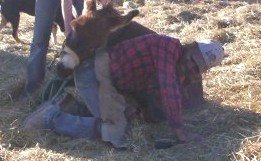
Mr. Personality! Kenai is a very playful young donkey. He can be seen playing with toys, balls and his buddies in the pasture.
On this day however, he was exceptionally playful and decided he was finished with this here farrier. Sat right down and protested! We couldn't help but laugh!
Patience plays a huge role in working with any animal. Those coming into our Sanctuary have normally had very bad experiences with people, especially farriers, that they do not want to be handled and have a very hard time trusting people. Many of them have been beaten into submission with rasps or other objects by farriers that do not have patience, making them even more skittish and untrusting.
Our farrier, pictured here, has done an excellent job over the last 2.5 years helping the Sanctuary and our many animals to recover and live a pain and stress free life. Come visit Darrin Hill at his next workshop for the Sanctuary on September 30, 2006 from 11 am to 1 pm to learn more about farrier work and see live examples of what poor work can cause along with neglect and different diseases of the hoof. Contact us at info@denkaisanctuary.org for more information or visit www.denkaisanctuary.org.

